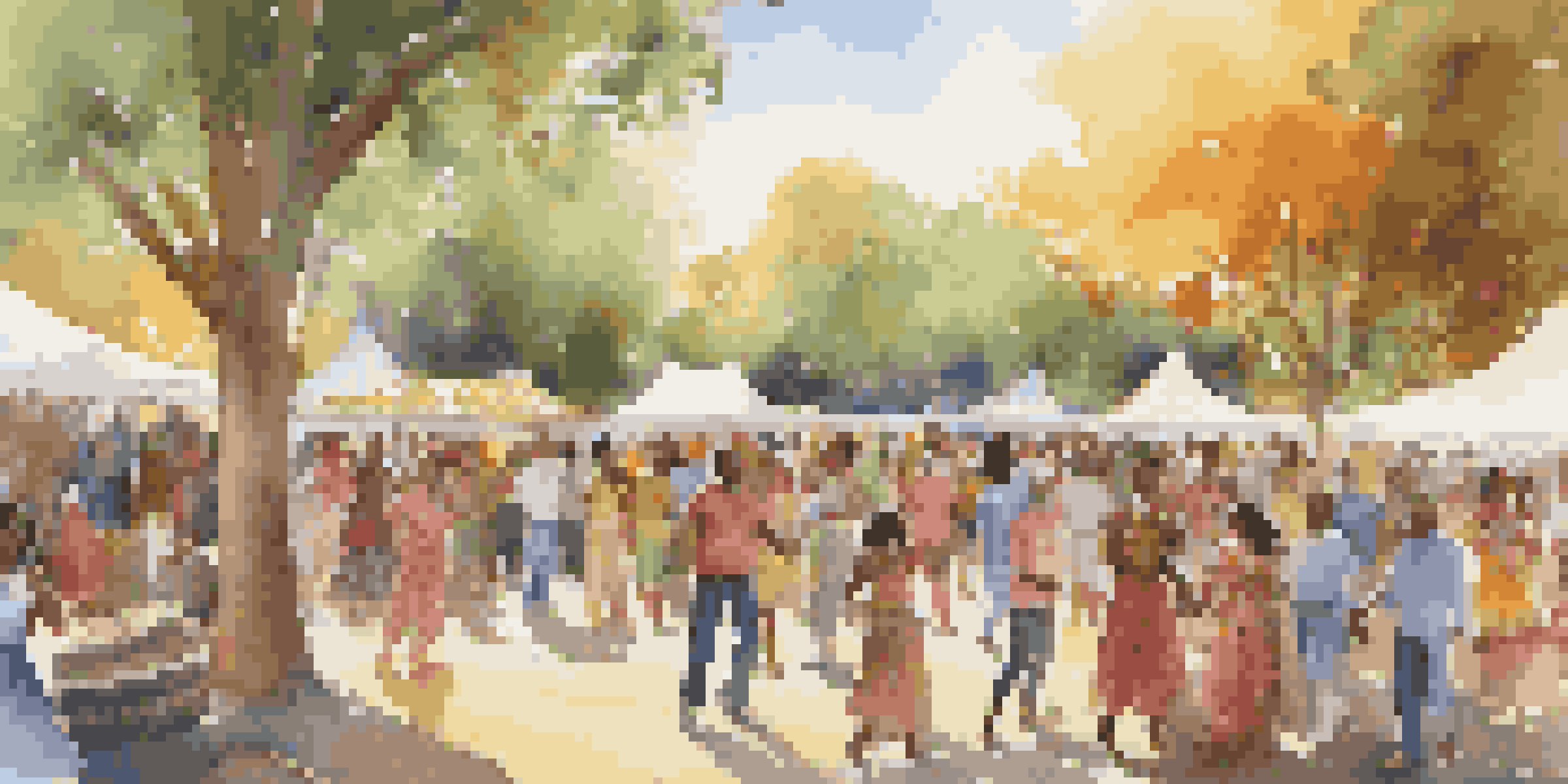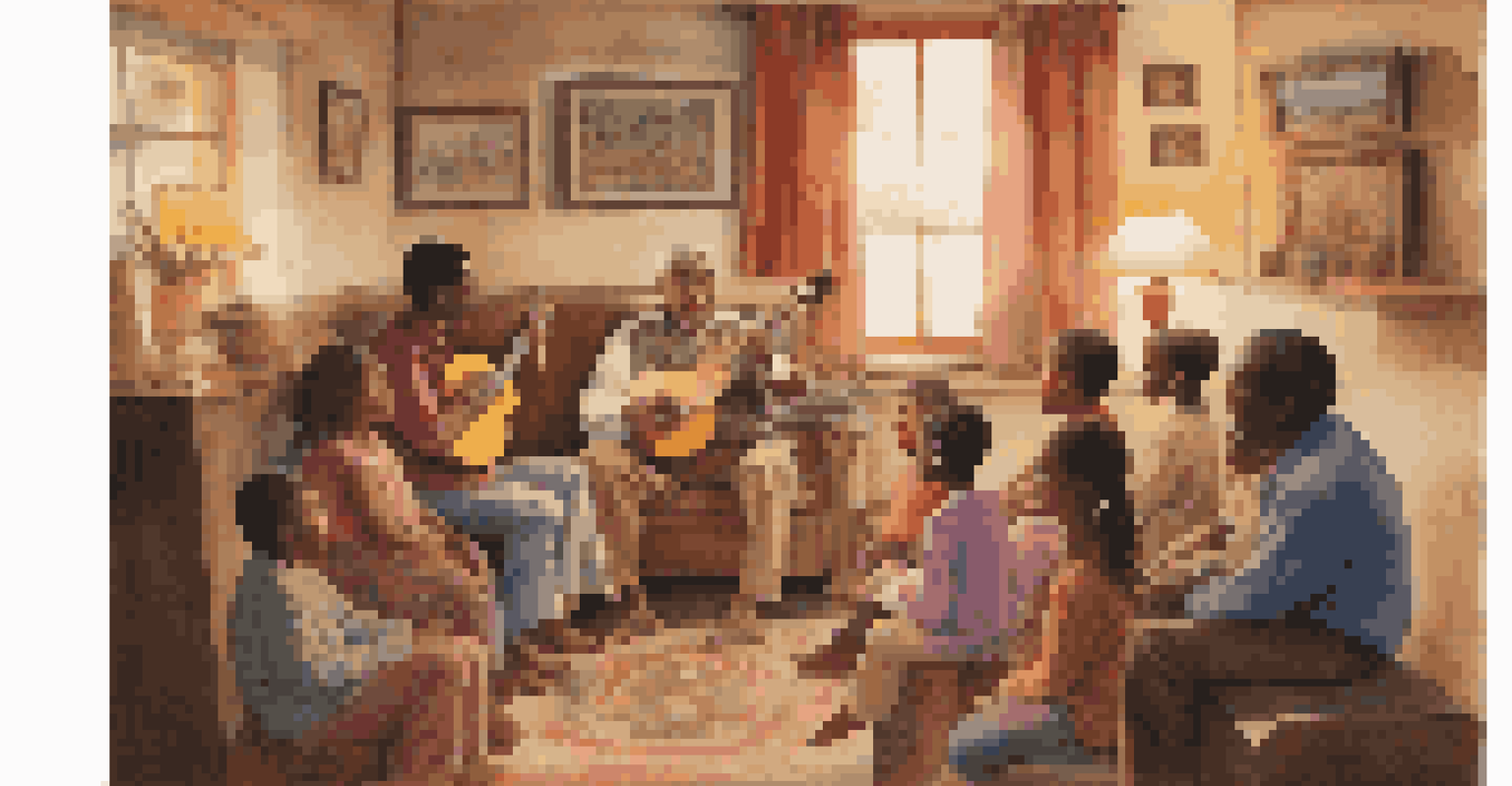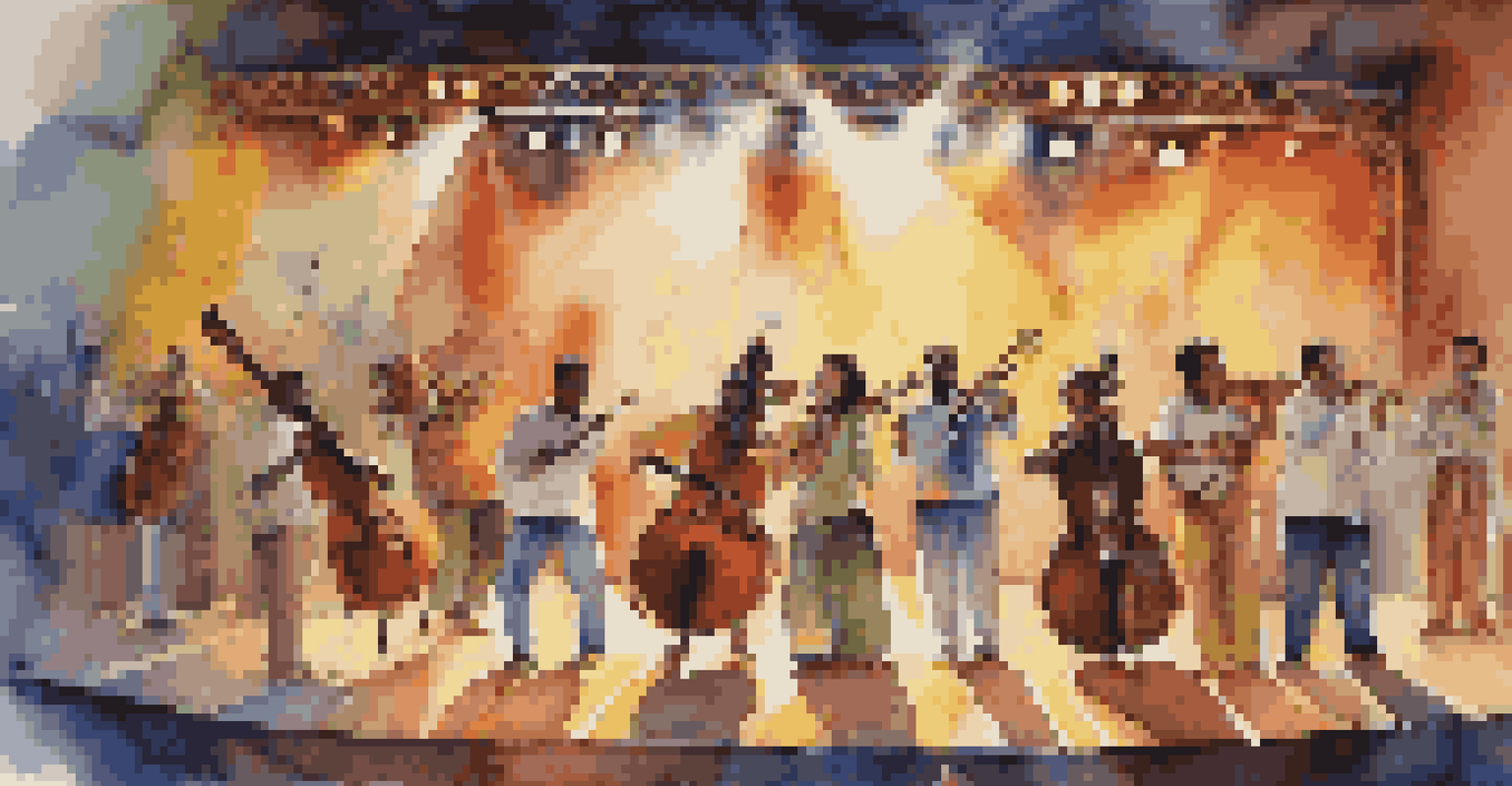The Role of Music in Connecting Diaspora Communities

Music as a Cultural Bridge for Diaspora Communities
Music serves as a powerful tool for connecting diaspora communities, acting as a bridge between their native culture and the new environment. It encapsulates shared histories, values, and experiences, allowing individuals to feel a sense of belonging even when far from home. For many, listening to familiar tunes can evoke feelings of nostalgia, reminding them of their roots and heritage. This cultural bridge not only fosters personal connections but also strengthens the collective identity of the community.
Music is the universal language of mankind.
Moreover, music often becomes a shared language among different generations within a diaspora. Elders may pass down traditional songs to younger members, ensuring that cultural narratives are preserved. In this way, music acts as both a memory keeper and a teaching tool, facilitating intergenerational dialogue about identity and belonging. As these songs resonate through time, they help weave a rich tapestry of communal life, making the diaspora experience more cohesive.
In an increasingly globalized world, the ability to share music across borders has never been easier. Digital platforms enable diaspora communities to connect with their roots, discovering artists from their homeland and sharing playlists that reflect their cultural identity. This cross-cultural exchange not only revitalizes traditional sounds but also encourages the creation of new genres that blend various influences, enriching the overall musical landscape.
The Emotional Impact of Music in Diaspora Life
Music has a profound emotional impact, often acting as a source of comfort and solace for individuals in diaspora communities. It can provide a way to process feelings of homesickness, loneliness, or even joy during celebrations. When people listen to songs that resonate with their experiences, they often find a sense of validation and understanding. This emotional connection helps to alleviate the challenges of adapting to a new environment.

For instance, community gatherings often feature music that evokes shared memories and traditions, turning strangers into friends. These events allow individuals to celebrate their heritage while also embracing their new surroundings. Songs sung in unison can create a sense of unity, reinforcing the bonds between community members. Through music, individuals find a shared experience that transcends language barriers and cultural differences.
Music Connects Diaspora Communities
Music acts as a cultural bridge, fostering connections and a sense of belonging among individuals in diaspora communities.
Furthermore, music can serve as a powerful medium for storytelling, allowing diaspora communities to share their narratives with the world. Artists often use their craft to discuss their journeys, struggles, and triumphs, creating a platform for dialogue and cultural exchange. By listening to these stories, both diaspora and local communities gain insight into each other's experiences, fostering empathy and understanding.
The Role of Traditional Music in Identity Preservation
Traditional music plays a crucial role in preserving cultural identity within diaspora communities. It serves as a reminder of where individuals come from and helps to maintain a connection to their ancestral roots. Many diaspora communities actively engage in the practice of traditional music, ensuring that it continues to thrive in a new context. This preservation not only honors their heritage but also educates younger generations about their culture.
Without music, life would be a mistake.
Celebrating traditional music often involves festivals, workshops, and performances that bring community members together. These gatherings allow individuals to participate in the cultural practices of their ancestors, reinforcing their identity and sense of belonging. Such events create a space where stories are shared, and traditions are passed down, further solidifying the community’s cultural fabric.
Additionally, traditional music can adapt and evolve, blending with contemporary styles while still honoring its roots. This fusion allows diaspora communities to remain relevant in the modern world while preserving the essence of their cultural identity. By embracing both traditional and contemporary music, these communities can create a unique sound that reflects their diverse experiences and journeys.
Contemporary Music Trends Among Diaspora Communities
Contemporary music trends have a significant impact on diaspora communities, as they often reflect the evolving identity of these groups. Genres such as hip-hop, reggaeton, and Afrobeats have found widespread popularity, often incorporating elements from various cultural backgrounds. This blending of styles creates a rich musical tapestry that resonates with both diaspora and local audiences. As artists experiment with their sound, they often forge new connections among diverse cultural influences.
Moreover, contemporary music provides a platform for diaspora artists to voice their experiences and challenges. By addressing themes such as migration, displacement, and cultural identity, these artists resonate with listeners who share similar backgrounds. This not only promotes understanding within the community but also raises awareness among wider audiences about the complexities of the diaspora experience.
Emotional Resilience Through Music
For many, music serves as a source of comfort and a way to process feelings of homesickness and joy.
Social media has played a pivotal role in promoting contemporary music trends within diaspora communities. Platforms like TikTok and Instagram enable artists to reach global audiences, allowing their music to transcend geographical boundaries. As a result, the fusion of traditional and contemporary sounds continues to evolve, creating a dynamic musical landscape that reflects the experiences of diaspora communities around the world.
Collaborative Projects: Uniting Diaspora Through Music
Collaborative music projects are a powerful way to unite diaspora communities, fostering connections across different backgrounds and experiences. These initiatives often bring together artists from various cultures, creating a melting pot of sounds and styles. Through collaboration, musicians can share their stories and celebrate their diversity, resulting in music that speaks to a broader audience. This sense of unity can be transformative, promoting understanding and appreciation among different communities.
Examples of successful collaborative projects include music festivals, cross-cultural albums, and community workshops. These events encourage participants to explore new musical styles while also honoring their own cultural heritage. By working together, artists and community members can create something beautiful that reflects their shared experiences, ultimately reinforcing the bonds within the diaspora.
Furthermore, these collaborations often inspire a new generation of artists to embrace their cultural identity while also exploring global influences. As emerging musicians engage with established artists from diverse backgrounds, they develop a unique sound that reflects their multifaceted identities. This blend of influences not only enriches the music scene but also strengthens the ties that bind diaspora communities together.
Music as a Tool for Social Change in Diaspora Communities
Music can serve as a powerful catalyst for social change within diaspora communities, addressing issues such as inequality, discrimination, and cultural representation. Artists often use their platform to raise awareness about the challenges faced by their communities, creating songs that inspire action and solidarity. Through their music, they can challenge stereotypes and promote positive narratives, fostering a sense of empowerment among listeners.
One of the most significant aspects of music's role in social change is its ability to mobilize communities. Concerts and events can serve as fundraisers or awareness campaigns, bringing people together to support important causes. When individuals unite through music, they create a collective voice that can influence decision-makers and drive positive change. This sense of community and shared purpose can be incredibly motivating, encouraging individuals to take an active role in advocating for their rights.
Traditions Evolve in Modern Music
Traditional music adapts and blends with contemporary styles, preserving cultural identity while remaining relevant.
Moreover, music has the power to transcend cultural barriers, making it an effective tool for building alliances between different communities. By collaborating with artists from diverse backgrounds, diaspora musicians can amplify their message and reach a broader audience. This solidarity not only promotes understanding but also fosters a sense of unity that can lead to meaningful social change.
The Future of Music in Diaspora Communities
As we look to the future, the role of music in diaspora communities is likely to continue evolving. The integration of technology and social media will further enhance the ways individuals connect through music, enabling even greater collaboration and sharing of cultural expressions. With the rise of virtual concerts and online platforms, diaspora communities can maintain their cultural connections regardless of geographical distances.
Additionally, as globalization continues to shape musical landscapes, we can expect to see an even more significant blending of genres and influences. Emerging artists will likely draw from their diverse backgrounds, creating innovative sounds that reflect the complexity of their identities. This evolution will not only enrich the music scene but also provide a platform for underrepresented voices within diaspora communities.

Ultimately, the future of music in diaspora communities holds the promise of continued connection, resilience, and creativity. As individuals navigate their identities and experiences, music will remain a vital thread that weaves together their stories, cultures, and aspirations. By embracing this dynamic evolution, diaspora communities can ensure that their rich musical heritage is celebrated and preserved for generations to come.